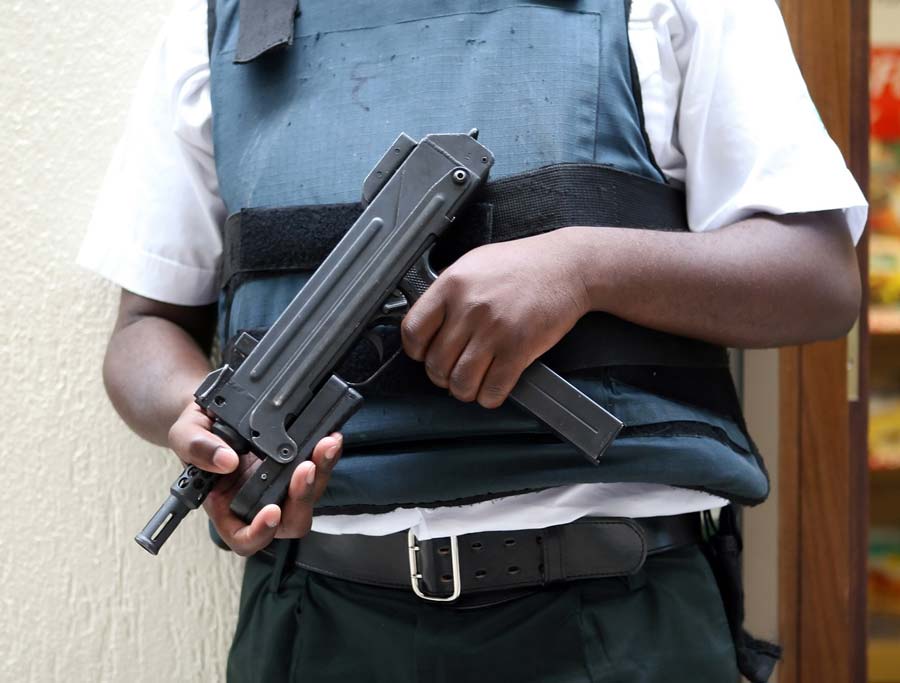
But like many synagogues across the country, Tree of Life had its doors open for Saturday's Sabbath services, welcoming its congregants. After a gunman entered and killed 11 people in the worst single attack on American Jews in U.S. history, President Donald Trump and others have suggested that armed guards stationed outside the synagogue might have prevented the carnage.
Now political and Jewish leaders across the country are grappling with whether that suggestion makes sense. How can they best secure religious spaces and still strike the proper balance between protecting congregants and creating a welcoming place of worship?
For the Jewish community, the debate surrounding synagogue security is not new, but Saturday's massacre could usher in a new era of ramped-up security measures.
Rabbi Aaron Alexander of Adas Israel Congregation in Washington, D.C., said the attack is a "game changer" for Jews, and for security at synagogues. While security budgets at synagogues have increased in recent years, Jewish communities have felt - accurately or not - a bit safer than smaller religious minorities in America, such as Muslims or Sikhs. That, he predicts, is about to change.
"Many of us knew a moment like this would happen and people would begin to feel more vulnerable in Jewish spaces, as many minorities feel," he said. "In that way, I think the culture is shifting."
On Sunday morning, Jewish leaders from across the country took part in a phone call with the FBI over security concerns, and many have been in close communication with the Secure Community Network, a nonprofit clearinghouse for information and training on how to handle potential threats to Jewish institutions.
Michael Masters, the network's chief executive and national director, said there has been a significant increase in security precautions at Jewish centers across the country in response to a rise in mass shootings and anti-Semitic attacks in the United States and Europe.
When the Secure Community Network was formed in 2004, only two of the 147 Jewish Federations found in most U.S. metropolitan areas with a large Jewish population had a full-time security director. Now that number is at 30, and Masters expects it to continue to grow. "I think we're going to see the trend continuing."
The Jewish Federation of Greater Pittsburgh, for example, two years ago hired former FBI agent Brad Orsini as the director of Jewish community security. Since then, the region has focused on building security, better coordination among synagogues and Jewish agencies and training staff on handling emergencies, according to Adam Hertzman, director of marketing at Pittsburgh's federation.
Security measures depend largely on a synagogue's size and budget. Larger synagogues generally have more robust security infrastructure than smaller congregations like Tree of Life, Masters said.
Har Shalom, the largest Conservative synagogue in Potomac, Maryland, for example, has an armed police presence during services, Hebrew school sessions and on-site events, Rabbi Adam Raskin said. "Security is now a big part of our budget, unfortunately," he said.
Raskin's rabbinical career has spanned 16 years, but this is the first time his congregation has had a security committee. For years, synagogues have ignored the occasional kooky piece of mail or message. Now, Raskin said, the temple contacts the police immediately.
The synagogue has never held an active-shooter evacuation drill during services, Raskin said. "Now, I think we're going to have a serious conversation about it."
For smaller synagogues with tighter budgets, paying for security measures such as armed guards might be financially impossible.
"To add a security guard could be prohibitive, and it could really cause people to choose between the kind of security that they have come to believe they need and the ability to gather in the first place," said Jack Moline of the Washington-based Interfaith Alliance.
Alexander, the rabbi at Adas Israel, said there is talk of trying to create a shared fund to help smaller synagogues or all small religious minorities that need assistance hiring security.
Ron Halber, executive director of the Jewish Community Relations Council of Greater Washington, said he feels the federal government needs to provide more resources to help synagogues fund security measures.
"How do we sustain this long term?" Halber asked. ". . . We can't go back to business as usual."
Edward Hamburg, a past president of Rodfei Zedek, a synagogue on the south side of Chicago, said he worried that U.S. synagogues could begin to mirror those in Europe with heavy security.
"We have taken steps to secure the synagogue, and will take more, but it will fall far short of what Mr. Trump is suggesting," Hamburg said. "There are cameras, there will be controlled traffic, there will be increased police patrols. I think the question will be how much further do we have to go in response to the situation?"
Some Orthodox congregations might have religious barriers to putting in place certain security measures, such as electronic identification systems, Moline said. Orthodox Jews refrain from using electronic devices from sundown on Friday to Saturday evening.
If synagogues start ratcheting up their security, with metal detectors and armed guards, some worry about the message it would send to congregants seeking a place of peace and holiness.
"We've always had this tension between wanting to be open to the community and wanting to be secure and a safe place," said Karen Brean, president of the board of trustees at Rodef Shalom, a Pittsburgh synagogue located down the road from Tree of Life. "Is this the kind of thing that we're going to expect on Shabbat morning, every week?"
(COMMENT, BELOW)


 Contact The Editor
Contact The Editor
 Articles By This Author
Articles By This Author